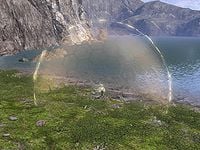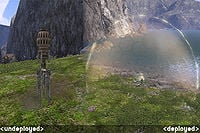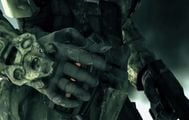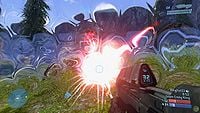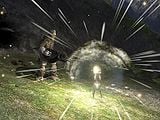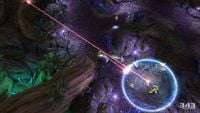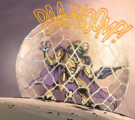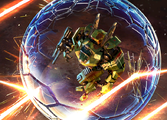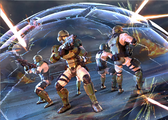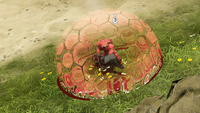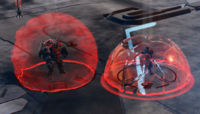Z-4190 bubble shield: Difference between revisions
From Halopedia, the Halo wiki
m (→Development history: link cleanup, replaced: Protector Sentinel (Shield World 0459) → Protector Sentinel (Trove)) |
|||
| Line 85: | Line 85: | ||
File:HW2 Blitz Reactive Cyclops.png|A [[Cyclops]] with a bubble shield in ''[[Halo Wars 2]]''. | File:HW2 Blitz Reactive Cyclops.png|A [[Cyclops]] with a bubble shield in ''[[Halo Wars 2]]''. | ||
File:HW2 Blitz Reactive Marines.png|Marines with a bubble shield. | File:HW2 Blitz Reactive Marines.png|Marines with a bubble shield. | ||
File:HW2 Alice's Blitz Bubble Shield.png|Alice-130 with a bubble shield. | |||
HW2_Reflective_Shields_Banished.png|Unique bubbles shields employed by the Banished. | HW2_Reflective_Shields_Banished.png|Unique bubbles shields employed by the Banished. | ||
</gallery> | </gallery> | ||
Revision as of 18:41, August 28, 2023
| Z-4190 bubble shield | |
|---|---|
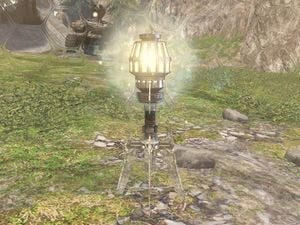
| |
| Production overview | |
|
Manufacturer: |
|
|
Type: |
Single use dissipative cover[1] |
| Specifications | |
|
Weight: |
45.1 pounds (20.5 kg)[1] |
|
Duration: |
Single use (20 seconds)[2] |
The bubble shield (UNSC Z-classification: Z-4190 Temporal Protective Enfolder/Stationary Shield, Z-4190 TPE/SS),[1] is a piece of deployable equipment. It is Forerunner in origin, but the United Nations Space Command's Office of Naval Intelligence manufactured a number of the devices based on discovery of those formerly used by Warrior-Servants.[1]
Overview
Design details
"Dissipative"-style bubble shields are a technology originally of Forerunner origin. They were used by the Warrior-Servants and various forms of Sentinel for protection, and later reverse-engineered by both the Covenant and Office of Naval Intelligence to form crude copies for use as battlefield deployable equipment.[1]
The bubble shield design used by humanity and the Covenant consists of an emitter capable of projecting a translucent, slightly white/gold tinted protective sphere sphere of interlocking hexagonal force enfolder elements around the user.[1] The shield itself is similar to a geodesic dome, made of tessellating hexagons. The shield protects against bullets, explosions, lasers, plasma, flames, grenades, and other projectiles. Vehicles and personnel, however, are still able to pass through it. After approximately 20 seconds have passed since activation, the shield will collapse and the generator self-destructs. Heavier stationary weaponry, such as the Shuku-pattern sentry turret, are capable of overpowering or firing through the shield.[3][4]
Development history
The bubble shield has a storied developmental history among the Covenant and the UNSC. The original designs for the bubble shield are based on Forerunner technology, used by the Warrior-Servants and some forms of Aggressor and Protector Sentinel.[1] These devices were crudely reverse-engineered by the Covenant, with examples themselves captured by the UNSC and used as the basis for the development of a bubble shield of human make during the later years of the Human-Covenant War.[5] During the Fall of Reach, many of the ONI prototypes for the deployable bubble shield were captured by Covenant forces and were crudely copied for use by loyalist Jiralhanae forces in the war's final months - particularly the Battle for Earth and Battle of Installation 00.[1]
ONI research into bubble shield technology also resulted in the development of a MJOLNIR Powered Assault Armor-compatible reusable armour ability known as the drop shield.[6] Manufacture of ONI-approved bubble shield devices continued until 2555, at which point they were discontinued and development efforts were refocused toward MJOLNIR-compatible emitters.[1]
Operational history
Bubble shields were used by the Warrior-Servant forces of the Forerunner Ecumene to provide temporary battlefield fortifications, with similar systems employed as the standard energy shielding mechanisms of various Sentinel classes.
During the Human-Covenant War, humanity were able to leverage bubble shield technology stolen from Covenant derivatives of the Forerunner originals in a number of forms. One such device was used by Blue Team during Operation: WARM BLANKET in 2544, to safely secure their boarding of the Covenant carrier Resplendent Fervor.[7] Another such system was later featured in a number of the HRUNTING/YGGDRASIL development program prototypes including the Mark I ADS and select refit packages for the Mark III [S] Cyclops.[8][9] Forms of bubble shield technology continued to be developed and used by UNSC forces through the late-war, with ONI developing the drop shield armour ability package based on the same operating principles, later used during the Fall of Reach.[6] Many of these designs were stolen from Reach by Covenant forces, and further developed and used by the Brute loyalist troops during the final weeks of the war.[10][11] Due to their size, mass, and relatively short power cell duration, along with low rates of production, Bubble Shields saw very limited use during the last stages of the Human-Covenant War.[1]
During simulations of the Battle of Installation 03 and Battle of New Phoenix a Spartan-IV utilized a version capable of allowing the user to fire weapons at targets while remaining inside the shield.[12] By 2555, production of ONI produced bubble shields was halted in favour of focus on MJOLNIR energy shielding,[1] though the existing prototypes continued to see use as late as January 21, 2558, in which SPARTAN-G059 deployed a bubble shield against Avu Med 'Telcam to block his Vostu-pattern carbine's rounds during her assassination mission.[13]
As of 2559, bubble shield technology has been leveraged by the forces of both UNSC Spirit of Fire and the Banished during their war for control of the Ark.[14]
In-game information
Halo 3 and Halo 3: ODST
In the campaign of Halo 3, Brutes deploy bubble shields often. At least one or two Brutes in a Covenant pack always have a bubble shield on hand. Brutes generally activate their bubble shields immediately when taking fire or when feeling threatened. Unlike the multiplayer "shield doors", vehicles are able to pass through the bubble shield. Damaging the shield generator itself in the bubble's enclosure will cause it to explode, and the shield will collapse upon detonation. Upon reaching its energy limit, bubble shields will make a high-pitched sound prior to overloading and exploding. In Halo: Spartan Strike the bubble shield can be used repeatedly with a duration of 8 seconds and a cooldown of 24 seconds.
- Disadvantages
- Enemies can enter the shield freely.
- The bubble shield only lasts about 20 seconds. In combat, however, this is more than enough time to regroup and recover.
- If either the player or an enemy throws a grenade inside the bubble shield, it stays inside and will more than likely kill almost everyone in the shield at that time. This strategy is most effective with spike grenades, as the spikes will bounce around and shred anything inside the shield.
- The generator is very delicate, and if shot from the inside, it will quickly explode and destroy the bubble shield.
- Vehicles can also enter bubble shields. Therefore, you can run somebody over while they are still in the bubble shield.
- The bubble shield can be affected by other equipment if thrown within the shield's proximity. For example, if an opponent throws in a portable gravity lift near the generator, the gravity lift can raise the shield generator up, leaving anyone previously inside the shield defenseless. Additionally, effects from equipments can also be limited in the shield; if a regenerator is thrown inside the bubble shield, only those within the shield are affected. Likewise, if a power drain is thrown inside an active bubble shield, the disabling effects of the power drain are contained within the bubble shield.
- The bubble shield can be knocked away by throwing a power drain or radar jammer at the generator, causing both objects to roll, and leaving anybody previously inside the shield exposed.
Trivia

|
See our gameplay information related to Z-4190 bubble shield on its gameplay page. |

|
Browse more images in this article's gallery page. |
- An early form of the bubble shield was used in the original teaser trailer for Halo 3. It is shown being used by John-117 to protect him from an incoming Wraith mortar. In the teaser trailer, the bubble shield looked like a type of grenade, leading to rumors that it would be one of the new grenade types.
- The bubble shield is capable of negating the effects of a Kill Ball, allowing players to go inside the ball.
- When deployed on an Elephant, the bubble shield does not work as intended- high-powered weapons such as the Spartan Laser will shoot right through, killing the user inside. However, five or more bubble shields will protect players inside its dome.
- In Halo: Spartan Strike, only Elite Majors are issued with bubble shields, while the player can equip it as default on certain missions.
Gallery
An early model of the bubble shield in the Starry Night trailer.
The bubble shield is capable of blocking practically all forms of attack throughout its duration, including Spartan Laser shots. Note the clear color from the Halo 3 Beta.
The bubble shield being used in Halo: Spartan Strike.
SPARTAN-G059 deploys a bubble shield over Avu Med 'Telcam in Knight takes Bishop.
A Cyclops with a bubble shield in Halo Wars 2.
List of appearances
- Starry Night (First appearance)
- Halo 3
- Halo Wars
- Halo 3: ODST
- Halo Legends
- Prototype
- The Package
- Odd One Out (non-canon appearance)
- Halo: Spartan Strike
- Halo: Tales from Slipspace
- Halo Wars 2
- Halo: Official Spartan Field Manual (Mentioned only)
Sources
- ^ a b c d e f g h i j k Halo Waypoint, Bubble Shield (Retrieved on Apr 10, 2021) [archive]
- ^ Halo Encyclopedia (2009 edition), page 340
- ^ Halo 3, multiplayer map Snowbound
- ^ Halo Encyclopedia (2011 edition), page 345: Although the Automated Plasma Turret caption pictures a Zo'op-pattern Weevil, the descriptive text refers to the Snowbound sentry guns.
- ^ Halo: The Essential Visual Guide, page 47
- ^ a b Halo Encyclopedia (2011 edition), page 355
- ^ Halo Legends, episode The Package (animated short), timestamp The Package
- ^ Halo Legends, episode Prototype
- ^ Halo Wars 2, Reactive Cyclops Blitz unit
- ^ Halo 3, Bubble Shield in-game equipment
- ^ Halo 3: ODST, Bubble Shield in-game equipment
- ^ Halo: Spartan Strike, Bubble Shield in-game equipment
- ^ Halo: Tales from Slipspace - Knight takes Bishop
- ^ Halo Wars 2, Reactive Blitz units
|
| |||||||||||
